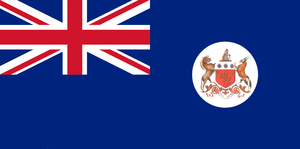Lowry Cole
| Sir Galbraith Lowry Cole | |
|---|---|
 Sir Galbraith Lowry Cole 1834 by William Dyce | |
| Born |
1 May 1772 Dublin |
| Died |
4 October 1842 (aged 70) Highfield Park, Hampshire, England |
| Allegiance |
|
| Service/branch | British Army |
| Years of service | 1787–1833 |
| Rank | General |
| Unit | 27th (Inniskilling) Regiment of Foot |
| Commands held |
4th Division Northern District |
| Battles/wars | Peninsular War |
| Awards | Knight Grand Cross, Order of the Bath |
| Other work |
Governor of Mauritius 1823-1828 Governor of the Cape Colony 1828-1833 |
Sir Galbraith Lowry Cole, GCB (1 May 1772 – 4 October 1842), styled The Honourable from birth, was an Irish British Army general and politician.
Army Service
Cole was commissioned a cornet in 1787,[1] and served in the West Indies, Ireland, and Egypt. He served as brigadier general in Sicily and commanded the 1st Brigade at the Battle of Maida on the 4 July 1806. In 1808 he was promoted to major-general, to lieutenant-general in 1813 and full general in 1830.[1]
He was colonel of the 27th Foot, commanded the 4th Division in the Peninsular War under Wellington, and was wounded at the Battle of Albuera in which he played a decisive part. He was also wounded, much more seriously, at Salamanca.
For having served with distinction in the battles of Maida, Albuhera, Salamanca, Vittoria, Pyrenees, Nivelle, Orthez and Toulouse, he received the Army Gold Cross with four clasps.[1] In 1815 he became General Officer Commanding Northern District.[2]
Member of Parliament
He was Member of Parliament in the Irish House of Commons for the family seat of Enniskillen from 1797 to 1800, and represented Fermanagh in the British House of Commons in 1803.
He was appointed 2nd Governor of Mauritius from 12 June 1823 to 17 June 1828. He left in 1828 to take up the post of Governor of the Cape Colony which position he filled until 1833. Cole was invested as a Knight Grand Cross, Order of the Bath on 2 January 1815.[1]
He is commemorated in Enniskillen by a statue surmounting a 30-metre (98 ft) column in Fort Hill Park, carried out by the Irish sculptor, Terence Farrell.[3]
Family
Cole was born the second son of an Irish peer, William Willoughby Cole, 1st Earl of Enniskillen (1 March 1736–22 May 1803), and Anne Lowry-Corry (d. September 1802), the daughter of Galbraith Lowry-Corry of Tyrone, and the sister of Armar Lowry-Corry, 1st Earl Belmore.[4]
Cole was married on 15 June 1815 to Frances Harris (d. 1 November 1847), daughter of James Harris, 1st Earl of Malmesbury, for whom Malmesbury, Western Cape is named, and Harriet Mary, his wife. Frances Cole played a prominent part in social philanthropy in the Cape and worked towards having Coloured children taught useful trades. Colesberg, a town in the Cape, is named after him, as is Sir Lowry's Pass near Cape Town. They had two children; Florence Mary Georgiana Cole, and Colonel Arthur Lowry Cole (24 August 1817–30 March 1885)
His elder brother John Willoughby Cole (23 March 1768–31 March 1840) married Charlotte Paget (d. 26 January 1817), the daughter of Henry Bayly Paget, 1st Earl of Uxbridge.
His sisters were:[4]
- Sarah Cole (d. 14 March 1833), married (1790) Owen Wynne
- Elizabeth Anne Cole (d. 1807), married (1788) Colonel Richard Magennis (d. 6 March 1831)
- Florence Cole (d. 1 March 1862), married (1797) Blaney Townley Balfour of Townley Hall, Drogheda, Co. Louth (d. 22 December 1856)
- Henrietta Frances Cole (22 June 1784–2 July 1848), married (20 July 1805) Thomas Philip Robinson, 2nd Earl de Grey (8 December 1781–14 November 1859)
References
- 1 2 3 4 "Lowry Cole". Queen's Royal Surreys. Retrieved 19 December 2015.
- ↑ Cole, John William (1856). "Memoirs of British Generals distinguished during the Peninsular War". London, R. Bentley. Retrieved 19 December 2015.
- ↑ "Fort Hill Park and Cole's Monument". Retrieved 19 December 2015.
- 1 2 The Peerage
Sources
 Stephens, Henry Morse (1887). "Cole, Galbraith Lowry". In Stephen, Leslie. Dictionary of National Biography. 11. London: Smith, Elder & Co.
Stephens, Henry Morse (1887). "Cole, Galbraith Lowry". In Stephen, Leslie. Dictionary of National Biography. 11. London: Smith, Elder & Co. - Stephens; Benyon. "Cole, Sir (Galbraith) Lowry (1772–1842)first2= John". Oxford Dictionary of National Biography (online ed.). Oxford University Press. doi:10.1093/ref:odnb/5848. (Subscription or UK public library membership required.)
